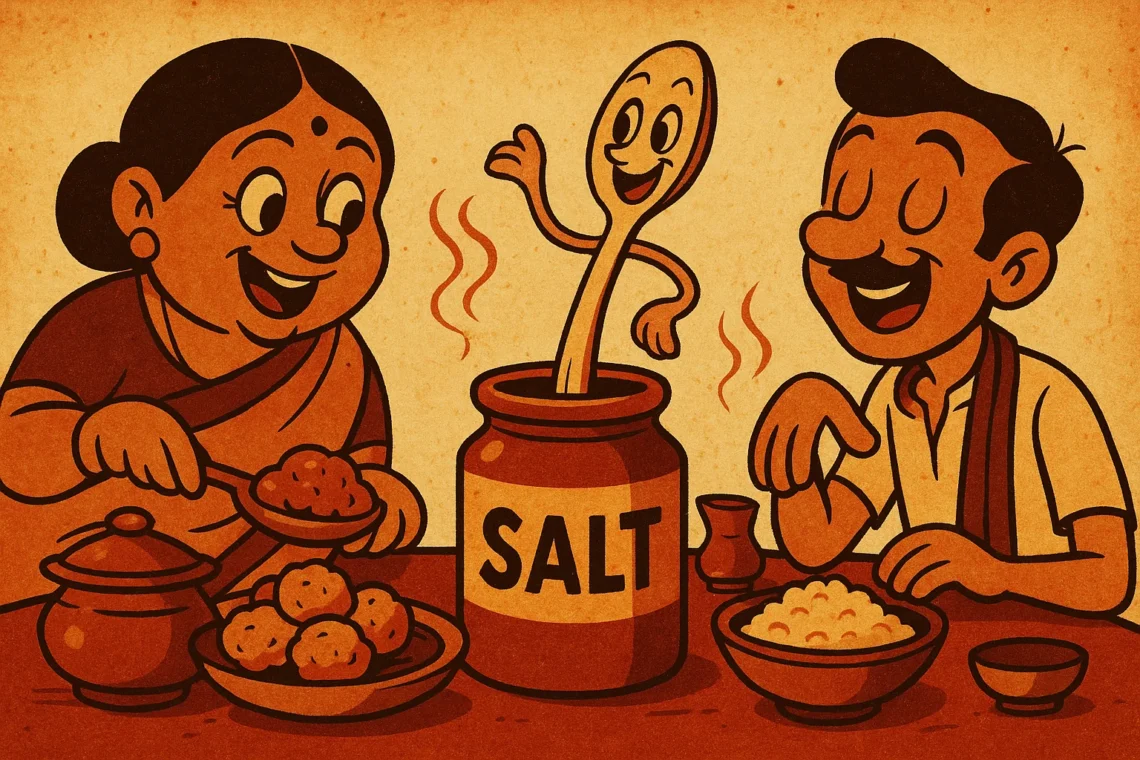It wasn’t fancy. Not silver or brass. Just a small, slightly bent steel spoon — the kind that never matched anything else on the table. It didn’t belong to a cutlery set. It didn’t make it to the dining drawer. It lived full-time in the salt jar, buried in fine, slightly clumpy crystals, ready for duty at every meal. And like many quiet objects in an Indian kitchen, it was never spoken about — but it was never absent either.
You don’t realize how important something is until it’s gone. The day I opened the salt jar and found a new, plastic spoon in its place, something shifted. The salt tasted the same. The dal hadn’t changed. But I felt off. Disoriented. Like someone had moved a tiny piece of my childhood and hoped I wouldn’t notice.
Everyday Things That Carry More Than They Should
That old salt spoon had been in our family for years. No one knew where it came from. Maybe it was part of a set gifted at my parents’ wedding. Maybe it was a leftover from an old train meal that accidentally made its way into our lives. But it stayed. Reliable. Ever-present. Its handle was smooth from years of pinching between oily fingers. Its edge had a slight dent, perfect for catching just the right amount — not too much, never too little.
And it was never washed with the rest of the dishes. It was wiped. Gently. Then tucked back into the jar like a bookmark, marking the spot in a story that never really ended.
The Salt Jar Was a Minor Throne
The jar itself was modest — glass, maybe once a jam container, repurposed like all good jars are. Its lid never screwed on properly, but it didn’t need to. It stayed on the kitchen shelf or in the middle of the table, close enough to reach but never in the way. And in it, the spoon waited. Patient. Trusted.
My grandmother had a specific method: she’d pick the spoon with her left hand, flick salt into the curry with a practiced wrist twist, and tap it twice on the rim before putting it back. No salt spilled. No spoon licked. Just the kind of precision that comes from years of cooking for people you love.
Inheritance Without Ceremony
No one ever said, “Take care of this spoon.” It wasn’t wrapped in cloth or stored in velvet-lined boxes. But it taught me more about care than heirlooms ever did. It was part of the background choreography of food and family. Like the knife that only cut onions. Or the plate that only your grandfather used. Objects that weren’t named, but never replaced. Not because they were valuable — but because they were true.
And that spoon — quiet, functional, slightly corroded — felt truer than most things in the kitchen. It reminded me that utility can be intimate. That repetition can become ritual. That you don’t need to be expensive or beautiful to be indispensable.
Now I Notice the Things That Stay
In my own kitchen today, I have salt in a sleek wooden grinder. It looks good on the counter, matches the pepper mill, and came with a five-star review. But I miss that spoon. The one you didn’t need two hands to operate. The one that had no settings or options — just a memory of meals, meals, and more meals.
So sometimes, I take a small steel spoon and stick it into the salt tin. It doesn’t match anything. But it feels familiar. It feels like home. It reminds me that some tools aren’t just tools. They’re habits made visible. They’re love stories in metal and motion.
The Things We Don’t Throw Away
The spoon that lived in the salt jar wasn’t special to anyone else. But it was part of the way our kitchen breathed. Quiet, overlooked, steady. And even now, if I close my eyes and think of home, I don’t see the spice box or the fridge or even the stove.
I see that spoon. Resting in salt. Waiting for the next hand. The next meal. The next moment of invisible magic.
Born in Mumbai, now stir-frying feelings in Texas. Writes about food, memory, and the messy magic in between — mostly to stay hungry, sometimes just to stay sane.












